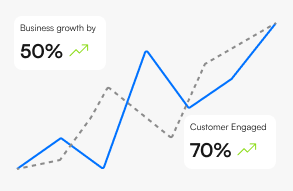AI Transformation: Pioneering the Next Era of Business Innovation

Rajesh Bhattacharjee
November 26, 2023
6 min

Table of Contents
Welcome to the world of AI in business! Imagine a world where businesses operate like well-oiled machines, making smart decisions quickly, understanding their customers like never before, and staying ahead of the competition. This is not science fiction; it’s the reality of Artificial Intelligence (AI) transforming the business landscape.
AI is more than just robots or sci-fi movies. It’s about advanced computer programs that can think, learn, and make decisions, changing how businesses work from the ground up. In this blog, we’ll explore how AI revolutionizes how companies operate and connect with their customers and why business leaders must pay attention.
Pioneering AI Transformation for Business Innovation
1. Understanding the AI Transformation Process
AI transformation is like giving your business a superpower. It involves integrating AI into every part of your company’s operations. This doesn’t mean just using a few tools here and there; it’s about a complete overhaul, where AI becomes a core part of how your business functions.
This transformation is a big deal in today’s business world. In a fast-paced digital era, they are staying competitive means being intelligent, quick, and adaptable. AI offers just that, helping businesses make smarter decisions, streamline operations, and innovate quickly.
2. Why AI Transformation is Essential
Why should businesses care about AI? Well, AI is like the ultimate business assistant.It is capable of processing extensive data sets to aid in more informed decision-making.. Think of it as having a crystal ball that can predict what customers want, even before they know it themselves!
AI also makes businesses more efficient. It can find the best way to do things, often in ways humans might not think of. This leads to faster, cheaper, and better operations. Plus, AI helps businesses scale up. It can do things that would require a lot of people and time but much faster and often at a lower cost.
3. The Future Landscape of AI Transformation
The future of AI in business is not just bright; it’s dazzling. By 2030, AI is expected to add a massive $15.7 trillion to the global economy. This is a clear sign that AI is not just a temporary trend but a key player in the future of business.
Embracing AI is becoming crucial for staying relevant in the competitive business world. Companies that don’t adopt AI risk falling behind. It’s no longer a question of if businesses should implement AI but how quickly and effectively they can do it.
4. In-Depth Look at AI Applications in Business Transformation
Decision Making with AI: Think of AI as a super-brain for your business. It can look at a mountain of data and find the hidden gold. AI tools like predictive analytics use past data to guess what might happen in the future. Machine learning algorithms learn from new data to make even better predictions. This means businesses can make smarter decisions faster.
Optimizing Operations with AI: AI is a top-notch efficiency expert for businesses. In manufacturing, it can predict when machines need fixing before they break down, saving time and money. In customer service, custom AI chatbots can answer common questions quickly, freeing up human workers for more complex issues. This leads to happier customers and less stressed employees.
Boosting Productivity with AI: Imagine having a robot assistant that handles all the tedious, repetitive tasks at work. That’s what AI can do. It takes the routine stuff so people can focus on their jobs’ more exciting and creative parts. This makes employees happier and helps the business innovate and grow.
Knowledge Management through AI: AI is fantastic at organizing and using large amounts of information. It can quickly process data to find meaningful insights, helping businesses use their knowledge more effectively. Think of it as a super-smart librarian who can find any book in a giant library in seconds.
Cost Reduction via AI: By automating tasks and making processes more efficient, AI can save businesses a lot of money. It’s like finding a way to make better products faster and cheaper, which is excellent for the business and its customers.
5. Successful AI Transformation Implementation
Strategies for Optimal AI Integration: Businesses need a good plan to get the most out of AI. They should determine where AI can make the most significant difference, like improving customer service or speeding up production. Then, they must slowly introduce AI in these areas, ensuring it works well and helps the business.
Workforce Development and Data Management: Having the right people and systems for AI is essential. Employees need training to work with AI tools. Also, the data that AI uses should be well-managed and secure. This means ensuring the data is accurate, up-to-date, and safe from hackers.
Fostering a Culture of Digital Innovation: Businesses must create a workplace where everyone is excited about using new technology like AI. This means encouraging employees to try new things without fear of change. When everyone supports using AI, it can help the business grow.
6. Sector-Specific AI Transformation Examples
Retail: AI is like a personal shopper for every customer. It recommends products based on customers’ liking, making shopping more accessible and fun. AI also helps manage inventory, so stores always have what customers want.
Healthcare: AI in healthcare is like a super doctor. It can diagnose diseases quickly and accurately and create perfect treatment plans for each patient. This means better care for patients and less pressure on doctors.
Finance: AI acts like a detective and financial advisor in finance. It can spot fraudulent activities quickly, keeping customers’ money safe. It also gives wise advice on investments, helping people make the most of their money.
7. Challenges and Ethical Considerations in AI Transformation
Addressing Data Privacy and Job Displacement: While AI is great, it also brings challenges. Keeping people’s personal information safe is very important. Also, as AI takes over some jobs, businesses need to think about how to help their employees adapt to new roles. Ethical AI Use and Transparent Policies: Using AI relatively and correctly is crucial. This means having clear rules about how AI should be used. Businesses must ensure their AI doesn’t discriminate against anyone and respect everyone’s rights.
Conclusion
AI transformation isn’t just about adding new technology; it’s like giving your entire business a makeover. It changes how companies make decisions, interact with customers, and handle day-to-day tasks. This isn’t just a small step forward; it’s a giant leap into the future. Businesses that embrace AI transformation are like surfers catching the most giant wave. They’re set to lead the way in innovation and efficiency. For those hesitant or slow to adapt, the risk is getting left behind.
This guide has taken you through the what, why, and how of AI in business. We’ve seen how AI can improve things faster and cheaper. We’ve also looked at the challenges, like keeping data safe and ensuring AI is fair and ethical.
The future is clear: AI is not just a nice-to-have; it’s a must-have for any business that wants to thrive in the digital age.

Grow Your Business with AI Agents
- Automate tasks
- Engage customers 24/7
- Boost conversions